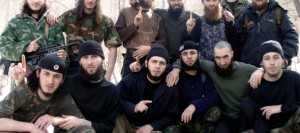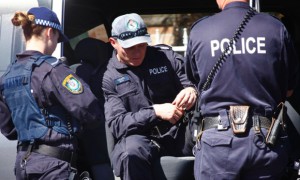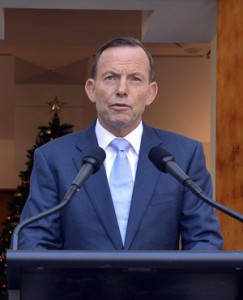DAILY MEDIA
AFTERNOON EDITION
TUESDAY 16 JUN 2015
NATO RAPID DEPLOYABLE CORPS – ITALY – Public Affairs Office –
More than 400 people from Chechen join Islamic State since 2011
More than 400 Chechen volunteers left Russia to join the fighting in Syria on the side of the Takfiri group, ISIL, since the beginning of the war in that region. The fate of most of them for the moment is unknown.
“A total of 405 people, according to our data, have left Chechnya to join the fighting in Syria on the side of the Islamic State since the beginning of the war in that region,” a spokesman for the Russian Interior Ministry told RIA Novosti.
“Among those, 104 have been killed and 44 came back, while the fate of the rest is unknown,” the official said, adding that 88 criminal cases have been opened against Chechen residents who fought in Syria.
Syria has been grappling with a deadly crisis since March 2011. The violence fueled by Takfiri groups has so far claimed the lives of over 210,000 people, according to reports. New figures show that over 76,000 people, including thousands of children, lost their lives in Syria last year.
Over 3.8 million Syrians have left their country since the beginning of the crisis. More than 7.2 million Syrians have also become internally displaced, according to the UN.
Mercenaries could help fight the tide of Isis
Islamic State selling ancient Hebrew and Aramaic manuscripts online
Having looted and pillaged ancient heritage sites across Iraq and Syria, Islamic State is now believed to be selling stolen artefacts on social media sites.
Facebook has now taken down pages thought to be selling artefacts such as coins, statues and manuscripts written in both Hebrew and Aramaic. It is thought that the items have all come from Syria.
ISIS militants have taken millions of pounds worth of artefacts from ancient buildings, including churches, across Iraq and Syria since the group began its uprising. A senior Iraqi intelligence official told the Guardian last year that jihadists had taken $36million, around £23million, from the al-Nabuk area – a mountainous region west of Damascus.
President of the Belgian federal police council, Willy Bruggeman, then told The Times in December that Western collectors are thought to be in direct contact with ISIS.
Militants are “using their own networks to come into contact with the final buyers…they want to have a one-to-one relationship with the collectors,” Bruggeman claimed. He said murals and masonry ripped from church walls are among the most commonly traded artefacts, and attacking religious sites is a means by which ISIS can “undermine the morale of the communities they invade”.
According to Fox News, stolen goods are usually transported through Turkey or Lebanon, where they are offered for sale. The International Council of Museums has issued a ‘red list’ to help police and custom officials to identify artefacts which have been taken illegally, but American imports of ancient artefacts from the Middle East and North Africa apparently increased significantly between 2011 and 2013.
Australia announces new counter-terror measures to combat Islamic State
The Abbott government will unveil new counter-terrorism legislation following a series of allegedly foiled attacks in Melbourne in the past months, the federal attorney-general has announced.
George Brandis made the announcement on the second day of a summit on challenging terrorist propaganda in Sydney, which he said would focus on strategies to fight Islamic State’s “electronic army”.
He did not divulge details of the new legislation, saying only it would “take into account lessons learned from recent legislative amendments and counter-terrorism operations”, but they are understood to include changes to the control order regime.
Control orders allow police to restrict a person’s movements, activities and associations without requiring a criminal conviction. Two were issued in the first decade after the powers were granted to police, and another two were placed on individuals in December last year.
The past six months have seen 23 people charged following eight counter-terrorism operations, including alleged plots in Melbourne to coincide with Mother’s Day and Anzac Day.
Brandis told the regional countering violent extremism summit on Friday the internet had allowed Islamic State “to reach a mass audience with slickly produced videos of their shocking and barbaric actions”.
“They have deliberately set about creating sophisticated, branded products and developing an electronic army to reframe these conflicts in a way that somehow appeals to our vulnerable youth, in particular vulnerable young members of our Muslim communities,” Brandis told a ministers’ meeting.
The summit heard on Thursday from Google and YouTube’s head of government relations, Samantha Yorke, in a closed session.
The internet giant has been reluctant to censor Islamic State material that falls within its guidelines, but has encouraged governments and community and religious groups to use its open platform to create content challenging the material Isis and other extremist groups put online.
Rob Wainwright, the director of Europol, has estimated that Isis supporters send up to 100,000 tweets each day from more than 50,000 accounts.
“To counter the prolific threat posed online, we’re establishing in Australia a social media monitoring and analysis capability,” Brandis said. “We’re also empowering credible and resident voices in our communities who can challenge terrorist narratives and promote powerful alternative messages.”
The $21.7m campaign to counter Isis’s online appeal would focus on “questioning its inconsistencies and exposing its false allegations by bringing to light its brutality,” he said.
“For example, highlighting the experiences of foreign fighters when they get to Iraq and Syria, only to discover that what they were told would be a glorious adventure is actually an experience in savagery, sexual slavery, lawlessness, isolation and poverty.”
He acknowledged that Muslim communities felt targeted by the government’s measures and rhetoric on the issue. “Australian Muslims do not want to be portrayed as victims and yet they can feel the weight of judgment on them for the actions of others, in particular the actions of others in far away places,” he said.
“But failing to acknowledge that they are being targeted only serves to exacerbate the threat, a threat that must be tackled head on through partnerships and with positive and proactive measures.”
Leaders of Muslim organisations such as the Lebanese Muslim Association and the Australian National Imam’s Council were not believed to have been invited to the summit.
A communique will be issued at its conclusion, expected to highight the role of families and communities in countering violent extremism. “We know that well informed and well equipped families, communities and local agencies are best placed to recognise and to intervene in the early stages of radicalisation to violence,” Brandis said.
At least 175 Australians are known to have travelled to Iraq and Syria to fight with Isis and other jihadi groups, with 110 thought to still be in the war zone. Around 30 are thought to have returned and another 35 have been confirmed to have died.
Australia’s Abbott warns of global ambitions of ISIS
ISIS has “global ambitions,” Australian Prime Minister Tony Abbott warned at a regional conference Thursday.
“Daesh is coming, if it can, for every person and for every government with a simple message: submit or die,” he said at the Countering Violent Extremism summit in Sydney.
Abbott was using a term based on the Arabic acronym for the movement that has seized a swathe of northern Syria and Iraq and proclaimed an Islamic caliphate.
The group has branches in Libya, Afghanistan and the Horn of Africa, Abbott said, and is trying to establish a presence in South Asia
The two-day conference was attended by some 27 ministers and officials from the region, with a focus on fighting online radicalisation, which Abbott called a “Hydra-headed monster”.
“The conflict in the Middle East is reaching out to us even in suburban bedrooms,” Abbott was quoted as saying by The Australian newspaper.
“What we’ve seen in Australia, quite young adolescents, almost children have been radicalised online by participating in chat rooms with people around the world.”
Abbott praised the Malaysian Prime Minister Najib Razak for saying the movement was unacceptable under Islam, and other Muslim leaders for questioning extremist interpretations of the scriptures.
Social media executives, including from Google, Twitter and Facebook, also attended the meeting to address the flow of propaganda from ISIS, which can reach 100 000 pieces per day, the report said.
Australia estimates around 100 of its citizens are fighting alongside militants in the Middle East.
It has barred suspect individuals from travelling to the region, and proposed other measures including the withdrawal of Australian passports from dual citizens found fighting with the extremists.
Jihad ‘mafia’: ISIS draining Al-Qaeda recruits, top clerics complain
Al-Qaeda’s organizational structure has “collapsed” due to the rise of Islamic State militants in the Middle East, Al-Qaeda spiritual leaders told the Guardian, adding that this would not have happened under Bin Laden’s rule.
The Guardian spoke exclusively to two members of the Al-Qaeda international terrorist group – Abu Qatada, a Muslim cleric who was often described as Osama Bin Laden’s spiritual ambassador in Europe, and Abu Muhammad al-Maqdisi, one of the world’s leading jihadist scholars.
Al-Qaeda’s structure has “collapsed,” Maqdisi told the paper, adding that the group “operates solely based on allegiance. There is no organizational structure. There is [sic] only communication channels, and loyalty.”
Maqdisi said that both he and Qatada “have been critical” of IS militants and the group “hates that.” Maqdisi served a five-year term in a Jordanian prison after being accused of recruiting extremists to Afghanistan. He was set free in 2014.
“They are like a mafia group,” said Abu Qatada, born Omar Mahmoud Othman. “ISIS don’t [sic] respect anyone. They are ruining the wider jihadi movement and are against the whole ummah [Arabic word for ‘Muslim nation’].”
Both clerics say they are particularity outraged by how IS extremists recruit people and use them against Al-Qaeda.
“ISIS took all our religious works,” said Maqdisi, who Ayman al-Zawahiri, the current head of Al-Qaeda, counts as a close friend. “They took it from us – it’s all our writings, they are all our books, our thoughts.”
The scholars say the IS militants’ insolence would never have been tolerated in Osama Bin Laden’s time.
“No one used to speak against him,” Maqdisi said. “Bin Laden was a star. He had special charisma.”
Zawahiri, who emerged as Al-Qaeda’s operational and strategic commander in 2009 after Bin Laden’s death, lacked “direct military or operational control” from the “very beginning,” Qatada said.
“He [Zawahiri] has become accustomed to operating in this decentralized way – he is isolated,” he added.
In 2000, Abu Qatada was sentenced to 15 years in prison in absentia for plotting to carry out terror attacks against American and Israeli tourists and Western diplomats during millennium celebrations in Jordan – the so-called “Millennium plot.”
However, 14 years later, he was released from prison just hours after a Jordanian court cleared him of all terrorism charges. Despite that, Abu Qatada won’t be able to return to the UK, the Home Office said. The radical cleric is under a UN worldwide travel ban.
The so-called Islamic State (IS, formerly ISIS) was formerly an affiliate of Al-Qaeda. However, in February 2014, Al-Qaeda publicly announced they had severed ties with the extremists due to a disagreement about tactics.
IS militants, who control large parts of Iraq and Syria, launched a massive PR campaign posting videos of executions on the internet, as well as other propaganda.
Islamic State militants eye Mecca, Medina
From the battlefields of Iraq and Syria, the terror group known as the Islamic State is preparing yet another front in its quest to reestablish an Islamic caliphate, this time hoping to wrest Saudi Arabia from a royal family that has long maintained its grip on power.
Saudi Arabia might seem to be an unlikely target for the Islamic State. Unlike countries such as Iraq, Syria and Libya, it is not a failed state. Also, just like the Islamic State’s leadership, Saudi Arabia’s rulers are adherents of Sunni Islam.
Still, counterterrorism officials, former diplomats and analysts say the threat to Saudi Arabia from the Islamic State is one that cannot be dismissed.
“Their ambitions don’t stop at Ramadi,” former U.S. ambassador to Iraq Ryan Crocker told VOA via Skype, referring to the Islamic State’s conquest of the contested capital of Iraq’s Anbar province.
“What they would really like to be able to do is penetrate into Saudi Arabia and take the holy cities of Mecca and Medina as the capital of their caliphate,” he added.
The latest barrage in the terror group’s opening salvo came just weeks ago with the Islamic State claiming credit for two suicide bombings targeting Shi’ite mosques in eastern Saudi Arabia.
More than 20 people died in the attacks on May 22 and May 29, and a recording issued by the Islamic State’s Saudi branch at about the same time called for more bloodshed.
“You must all come to burn the thrones of the tyrants,” it said, according to the U.S.-based SITE monitoring center.
U.S. counterterrorism officials say such threats are in line with other Islamic State propaganda, which has often tried to incite attacks against Saudi authorities and which has claimed responsibility for shootings targeting Saudi police and Westerners.
“The group’s apparent attempts to establish cells inside Saudi Arabia would be consistent with their strategy,” a counterterrorism official told VOA on condition of anonymity.
Whether the Islamic State has the wherewithal to follow through, however, remains a question. By most accounts, the group’s presence in Saudi Arabia is small. Its sympathizers have also come under heavy pressure from Saudi authorities, who in April announced the arrests of 93 suspects, 65 of them Saudi citizens.
“ISIS, though it has a small presence in Saudi Arabia, is doing what it can to launch spectacular, explosive attacks that can incite sectarian tension and lead to internal strife,” said Harleen Gambhir, a counterterrorism analyst at the Institute for the Study of War.
Gambhir and others warn the presence may be even bigger due to Islamic State “sleeper cells” in Saudi Arabia and nearby Yemen.
Saudi Arabia has also been fertile ground for extremist groups, including the Islamic State, looking for jihadist recruits.
A study earlier this year by the International Center for the Study of Radicalization and Political Violence (ICSR) found that of the more than 20,000 foreign fighters thought to have gone to Syria and Iraq, 1,500-2,500 had come from Saudi Arabia. At the time, researchers said only Tunisia had been thought to have sent more fighters to the front.
Other analysts say the numbers may be even higher.
“We’re talking thousands of people, probably two- to three-thousand people from Saudi Arabia who have gone to fight for the Islamic State,” said Patrick Skinner, director of special projects at the Soufan Group.
If some of those foreign fighters decide to return, or if would-be foreign fighters decide to stay, Skinner said it will put the Islamic State in position to give the Saudi government a fight.
“They won’t be able to topple anything but that’s not probably even what they want,” Skinner said. “They just want to keep picking at it until it’s a thousand cuts and the government overreacts and then they can kind of feed into some popular resentment.”
Unlike in Syria, Iraq and Libya, the Islamic State group will not be able to take advantage of a weak or non-existent central government. Current and former U.S. officials say Saudi police, intelligence and counterterror units are more than capable of cracking down.
“The Saudis really cleaned house for a while,” Skinner said. “The problem is, it’s such a dirty house that it’s near impossible to clean.”
Another part of the problem is the longstanding undercurrent of support for extremist thinking, especially among youth, combined with what had been a constant flow of funding for radical religious leaders who straddled the fine line between ultra-conservative teachings and extremist ideology.
“I think the Saudis have done a lot better,” said former U.S. ambassador Mark Wallace, now the chief executive officer at the Counter Extremism Project. “Certainly there are always individual power brokers that we have to be vigilant about and that the Saudis have to be vigilant about as well.”
Still, the temptation or pressure to restore that funding may be growing as Riyadh’s proxy war with rival Tehran becomes more intense, with some analysts warning the conflict is already causing many Saudi officials to view events in the Middle East through a Sunni-Shi’ite lens.
“As this clash between Iran and Saudi Arabia intensifies, I think it’s going to be pretty unavoidable that the Saudis are going to support the Islamic State or support militant groups that are under the Islamic State’s umbrella,” said Reuel Marc Gerecht with the Foundation for Defense of Democracies.
NATO RAPID DEPLOYABLE CORPS – ITALY – Public Affairs Office –
- « Previous Page
- 1
- …
- 124
- 125
- 126
- 127
- 128
- …
- 268
- Next Page »









